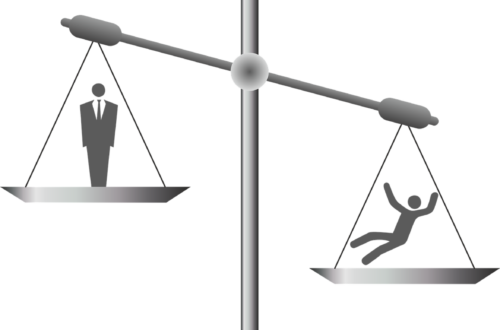
Plato: Tyrants are the Most Miserable People
Plato’s notion is that tyrants, or those people devoted to achieving wealth and power above all else, are the most miserable people. This concept blows a big hole in the ethos of Capitalism.
In our materialist version of capitalism, the goal of life is to gain as much wealth and power as possible so you can “win” the game.
Trump, Musk and Their Minions
However, if we look around at some of those who have attained these goals, they don’t look happy. Take Donald Trump and Elon Musk, for example. They have achieved wealth and power, yet don’t seem to enjoy it much. Trump never looks happy or content as he lumbers under the heavy weight of his ego, attacking anyone with anything negative to say about him.
And Musk, from all reports, needs ketamine to overcome depression and to pump him up so he can jump around on stage with his chainsaw, going through manic histrionics. Here is the richest man in the world, but that wealth hasn’t seemingly given him peace or contentment.
Trump and Musk’s insatiable lust has prompted them to gut programs to benefit average Americans and use that money for more tax cuts for themselves and fellow billionaires.
Yet, with all that wealth and power, Trump and Musk take joy in making others miserable, taking away jobs, social security, and health care while threatening the existence of this planet, eliminating regulations on fossil fuels and other environmental protections.
You would think, being joyful and content, you’d want to spread that wealth and joy around. Think about the last time you felt elated and on top of the world. Did you feel like sharing that joy with friends, family, and others, or did you feel like screwing them over?
Plato’s Tripartite Soul
Plato’s view of the tripartite soul (the three-part soul) explains why these would-be tyrants are the most miserable people on earth, and in denying their misery, they project it onto the rest of us.
Plato believes the three parts of the soul are the Appetite, Spirit, and Reason. Appetite is tied to the body, Spirit to the heart, and Reason to the mind.
This model may seem simplistic but it makes our point. Appetite includes our impulses and desires for material things like food, water, sex, money, and power.
Spirit refers to our emotions, feelings and intuitions, while Reason encompasses analysis, logic, intelligence, and wisdom. It also includes “Nous,” the Greek term that means the eternal aspect of our souls. The question for Plato became which part of the soul should govern our lives. Is it our Appetites, Spirit, or Reason?
If our Appetites rule us, then we will never be satisfied. As soon as one desire is attained, we seek the next, never giving ourselves a chance to enjoy what we have achieved.
We do this because we compete with others for the best car, house, computer, job, etc. Once we are an elite member of society, we want to be the elite of the elite. Nothing is ever enough, contentment unattainable.
Reason is the counterbalance to the Appetites. It can analyze and evaluate what is best for us. It tempers our Appetites, analyzing which ones to follow, understanding that mindlessly following them will lead to disaster.
For example, let’s say you are a student with a critical final exam in the morning and know you must do well to continue your path to success. But let’s say a friend informs you of a great party that night. It’s the end-of-the-semester party, and everybody will be there.
You want to go but realize the importance of your upcoming test. Your Appetite says go, while your Reason says study.
Plato then says Spirit, the third aspect of your soul, enters the picture, siding with your Appetites or Reason. What will help it decide?
Spirit tests where your true heart lies. If you are on this path because your parents or a guidance counselor thought it was best, then this dream isn’t necessarily yours, and very likely, your Appetites will win here.
However, suppose this major is something you have chosen for yourself because it holds great interest and meaning. In that case, Reason will win out.
Justice in the Soul
Plato uses this tripartite model to decide if a person has justice in their soul. By that, he means the three aspects, Appetite, Spirit, and Reason, fulfill their proper roles in our souls. In other words, is the Appetite or Reason running the show?
Plato defines a “good” person as one whose Reason is in harmony with Spirit, while a bad person’s Appetite has control.
According to Plato, the good person is happy thanks to a well-ordered, functioning soul, and the bad person is miserable because of a disordered, non-functioning soul.
Plato compares this to a chariot, with the charioteer being Reason and the two horses Spirit and Appetite. The chariot gets to where it’s going only if the charioteer is in control. The chariot will crash and burn if the horses are in control.
Applying the Tripartite Soul to Trump, Musk and their ilk
So, in applying this analogy to Trump, Musk, and his other billionaire bros, we can see they have achieved material success but lack justice in their souls because Appetite rules.
Even with success, wealth, and power, their desire for more is irresistible, pushing them so far that they are willing to take jobs, money, health care, and social security, among other things, from those who need it the most.
For Plato, this is a disordered soul that is out of balance. Such a soul can never be happy because it can never be satisfied. Once they have taken everything from everybody (let’s hope it doesn’t get this far), they will start preying on each other because everyone is a potential enemy and competitor.
They are the most miserable because there are laws that restrict the actions of most people controlled by their appetites and base impulses.
However, laws may no longer control would-be tyrants like Trump, Musk, and those around them. They hope to become the law itself.
It might sound like victory to them, but Plato contends they have the most disordered and unjust souls, and therefore are the most miserable people. There is nothing to rein them in, and they are too weak to control themselves.
It comes down to whether you are using your wealth, power, and talents to serve others or just yourself.



